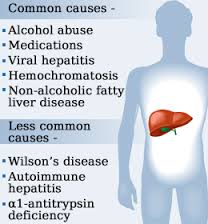
What causes raised (elevated) liver enzymes?
 Causes
Causes
By Mayo Clinic Staff
Many diseases and conditions can contribute to elevated liver enzymes. Your doctor determines the specific cause of your elevated liver enzymes by reviewing your medications, your signs and symptoms and, in some cases, other tests and procedures.
More common causes of elevated liver enzymes include:
- Certain prescription medications, including statin drugs used to control cholesterol
- Drinking alcohol
- Heart failure
- Hepatitis A
- Hepatitis B
- Hepatitis C
- Nonalcoholic fatty liver disease
- Obesity
- Over-the-counter pain medications, particularly acetaminophen (Tylenol, others)
Other causes of elevated liver enzymes may include:
- Alcoholic hepatitis (severe liver inflammation caused by excessive alcohol consumption)
- Autoimmune hepatitis (liver inflammation caused by an autoimmune disorder)
- Celiac disease (small intestine damage caused by gluten)
- Cirrhosis (early stages of liver scarring)
- Cytomegalovirus (CMV) infection
- Dermatomyositis (inflammatory disease that causes muscle weakness and skin rash)
- Epstein-Barr virus
- Gallbladder inflammation (cholecystitis)
- Heart attack
- Hemochromatosis (too much iron stored in your body)
- Hypothyroidism
- Liver cancer
- Mononucleosis
- Pancreatitis (pancreas inflammation)
- Polymyositis (inflammatory disease that causes muscle weakness)
- Toxic hepatitis (liver inflammation caused by drugs or toxins)
- Wilson’s disease (too much copper stored in your body)
← Exercise beneficial in decreasing fatty liver developmentThe Drug Costs $95K. Its Maker 'Dodged' $10B in Taxes →